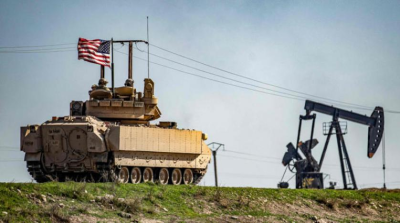NOVANEWS
![Photo: (L-r) Randa Slim, Naufel Al-Hassan, Abdullah Al-Dardari, Paul Salem. [Staff Photo Phil Pasquini]](https://www.wrmea.org/images/2018/03/15/2018meimarch7.jpg)
Photo: (L-r) Randa Slim, Naufel Al-Hassan, Abdullah Al-Dardari, Paul Salem. [Staff Photo Phil Pasquini].
Washington, DC’s Middle East Institute (MEI) presented a March 7 panel discussion on the Baghdad Declaration of Dec. 16, 2017, a process that took place over many years, with participants from Iran, Iraq, Turkey, Syria, Lebanon, Saudi Arabia, UAE, Egypt, the Arab League, and the U.N. The document sets forth 12 principles for promoting regional cooperation in the Middle East, principles which are the bedrock of all regional cooperation systems.
Moderator Randa Slim, MEI’s director of conflict resolution and the Track II Dialogues Initiative, asked panelists why a new regional cooperation framework is needed for the Middle East and what obstacles and challenges it faces, particularly in relation to Iraq and Syria.
“We are reaching a turning point where the region and the world must work together,” explained Naufel Al-Hassan, deputy chief of staff to Iraqi Prime Minister Haider Al-Abadi, regarding security and economic issues alike. “We cannot do this alone. We can do more by cooperating and building bridges than fighting each other. We have mutual threats—not just political or security, but environmental changes, also.”
Damascus-born Abdullah Al-Dardari, the World Bank’s senior adviser on reconstruction for the Middle East and North Africa, agreed on the need for regional cooperation. Beyond trade, he said, this region has the highest level of intra-regional remittances anywhere in the world. “I can tell you that in the past seven years what kept a large part of the Syrians alive is the remittances, mainly from the two million Syrians in Saudi Arabia and half a million in the UAE.” After a recent trip to Baghdad, he added, “I was heartened to see hundreds of young Syrian men and women working in tourism and restaurants and sending money back home and sustaining their families back home.
“There is no future for the economy of the region if each country is by itself,” Al-Dardari continued. “Our labor markets, productive bases and assumption markets are too narrow with each country operating on its own.”
Al-Dardari discussed the costs of rebuilding the region following the destruction of the past seven years of civil war in Syria and the need for restoring hospitals and providing health services now. “We have to find reasonable solutions for education and health services for our citizens,” he stated. “People in Syria and Iraq cannot wait.”
Lastly, turning to the subject of rebuilding Aleppo and Mosul, he argued that “There is no future for Aleppo without Mosul. If you don’t know how close these two cities are, and don’t understand the bonds that brought them together in the past and should bring them together in the future, our planning for rebuilding both cities will be incomplete, to say the least.”
Paul Salem, senior vice president for policy research and programs at MEI and co-editor of From Chaos to Cooperation: Toward Regional Order in the Middle East, emphasized that there is currently a tremendous amount of interdependence, integration and interaction in the region.
At the same time, he stressed the need for “a regional corridor or regional rules of the game that would not only protect against conflict and proxy conflict and waste of resources, but would actually go beyond that to build on common interests, plans and markets.” Moving forward, a regional vision is needed based on mutual respect, Salem said. “National leaders must call for regional transformation,” he concluded. “That kind of diplomacy is a sign of strength—a sign of boldness, rather than a sign of weakness.”
Salem then briefly discussed the following 12 principles delineated in the declaration:
Moderator Randa Slim, MEI’s director of conflict resolution and the Track II Dialogues Initiative, asked panelists why a new regional cooperation framework is needed for the Middle East and what obstacles and challenges it faces, particularly in relation to Iraq and Syria.
“We are reaching a turning point where the region and the world must work together,” explained Naufel Al-Hassan, deputy chief of staff to Iraqi Prime Minister Haider Al-Abadi, regarding security and economic issues alike. “We cannot do this alone. We can do more by cooperating and building bridges than fighting each other. We have mutual threats—not just political or security, but environmental changes, also.”
Damascus-born Abdullah Al-Dardari, the World Bank’s senior adviser on reconstruction for the Middle East and North Africa, agreed on the need for regional cooperation. Beyond trade, he said, this region has the highest level of intra-regional remittances anywhere in the world. “I can tell you that in the past seven years what kept a large part of the Syrians alive is the remittances, mainly from the two million Syrians in Saudi Arabia and half a million in the UAE.” After a recent trip to Baghdad, he added, “I was heartened to see hundreds of young Syrian men and women working in tourism and restaurants and sending money back home and sustaining their families back home.
“There is no future for the economy of the region if each country is by itself,” Al-Dardari continued. “Our labor markets, productive bases and assumption markets are too narrow with each country operating on its own.”
Al-Dardari discussed the costs of rebuilding the region following the destruction of the past seven years of civil war in Syria and the need for restoring hospitals and providing health services now. “We have to find reasonable solutions for education and health services for our citizens,” he stated. “People in Syria and Iraq cannot wait.”
Lastly, turning to the subject of rebuilding Aleppo and Mosul, he argued that “There is no future for Aleppo without Mosul. If you don’t know how close these two cities are, and don’t understand the bonds that brought them together in the past and should bring them together in the future, our planning for rebuilding both cities will be incomplete, to say the least.”
Paul Salem, senior vice president for policy research and programs at MEI and co-editor of From Chaos to Cooperation: Toward Regional Order in the Middle East, emphasized that there is currently a tremendous amount of interdependence, integration and interaction in the region.
At the same time, he stressed the need for “a regional corridor or regional rules of the game that would not only protect against conflict and proxy conflict and waste of resources, but would actually go beyond that to build on common interests, plans and markets.” Moving forward, a regional vision is needed based on mutual respect, Salem said. “National leaders must call for regional transformation,” he concluded. “That kind of diplomacy is a sign of strength—a sign of boldness, rather than a sign of weakness.”
Salem then briefly discussed the following 12 principles delineated in the declaration:
- Sovereignty and territorial integrity.
- Inclusive consultation and dispute resolution mechanism.
- Good governance.
- Defeat of terrorism.
- Strengthening state security institutions.
- Respect for ethnic, religious, sectarian and cultural diversity.
- Commitment to return of refugees.
- Acknowledgment of the principle of security through cooperation.
- Regional economic integration.
- Cultural and educational interaction.
- Regional confidence-building measures and pilot initiatives, including security, the economy, education and culture.
- Working toward a permanent and structured cooperation framework.



